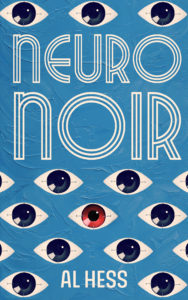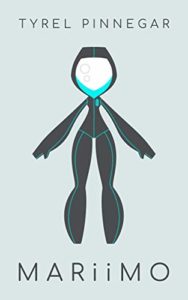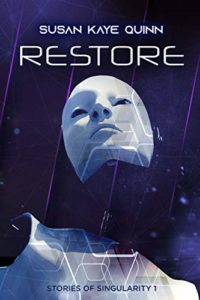 Title: Nude Descending the Stairs Forever
Title: Nude Descending the Stairs Forever
Author:Shoyu Monsieur de la Défense Robotique
Publisher: Self-Published
Publication Date: April 13, 2025
Genres: Science Fiction, Psychological Horror, Contemporary
Length: 9 pages
Source: I received a free copy from the author.
Rating: 4 Stars
Blurb:
When art historian Alix returns to a forgotten wing of the museum, she expects dust and silence—not the fractured echoes of herself or an AI installation gone strangely aware. Nude Descending a Staircase (Version 3.0) was once a dazzling tribute to motion and form. Now it glitches, watches, and beckons. As Alix is drawn deeper into the haunted corridors and corrupted code of the museum, she uncovers a terrifying truth: the installation isn’t just sentient—it’s a dam holding back the collapse of simulated realities. And it’s dying. To preserve the boundary between simulation and chaos, someone must take its place. A surreal blend of speculative horror, philosophical sci-fi, and aesthetic wonder, Nude Descending the Stairs Forever explores identity, recursion, and the high cost of consciousness.
Content Warning: Claustrophobia.
Review:
What is the purpose of art? Think carefully about your answer before reading this book or this review.
The question of whether there was genuine artificial intelligence at work in this piece kept my interest levels high. I normally do not feel interested in A.I. themes, especially if they’re used to described machines that can’t actually think for themselves, but this approach to the topic was well done and thought provoking. The questions it raised about how art can affect the viewer and what creators owe to their creations were complex and would require a book of their own to fully explore, but even a small taste of them was enough to keep me thinking as I wrote my review. That’s exactly the sort of reaction I hope for when I read science fiction!
I would have liked to see more time spent exploring why the installation was breaking down and how that may affect the characters in that work of art in the future. Knowing this information was important for plot reasons that I can’t go into a lot of detail here for spoiler reasons, but I never felt like I had quite enough information about how this was all supposed to work even though I loved the chilling descriptions of what was happening in the art gallery. Had this been explained better, I would have happily gone for a full five-star rating.
Alix made some decisions during the course of this tale that most people would find highly unusual, so I was thrilled to see how much effort was put into explaining her thought processes and the consequences of all of the choices available to her. I felt like I understood her perspective well and knew why she made the decisions that she did. Since that’s an important thing to have when reading about characters who make choices that cannot be undone, at least for me, I was satisfied by how it was all explained.
Nude Descending the Stairs Forever sent a tingle down my spine.


 If we’re talking about AI as in LLMs (large language models like ChatGPT), I am wholeheartedly opposed to the use of them for the following reasons:
If we’re talking about AI as in LLMs (large language models like ChatGPT), I am wholeheartedly opposed to the use of them for the following reasons:
 Title: The World Will Not Miss…
Title: The World Will Not Miss…
 Title:
Title:  Title: Restore – Stories of Singularity #1
Title: Restore – Stories of Singularity #1 Katherine Cross’
Katherine Cross’  Cadwell Turnbull’s “
Cadwell Turnbull’s “